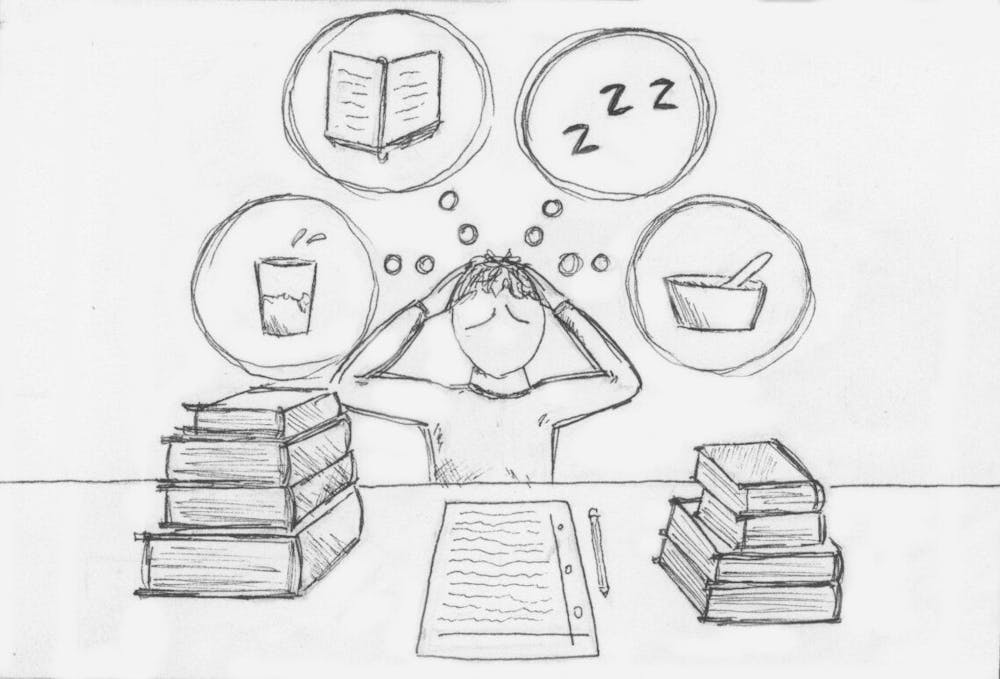Are you a student who is anxious about returning to school in the fall?
You’re not alone. Going back to school and creating a whole new routine can be not only overwhelming, but difficult to maintain.
Here are five students' perspectives on how to manage and reduce stress for the upcoming quarter.
Marísa Fernandez is currently earning her master’s in clinical mental health counseling at Western Washington University. Her first recommendation for reducing stress is to decompress, which she acknowledges is different for everyone.
“I do love listening to audiobooks and keeping my mind going in that way when there's not as much brain stimulation because I’m not in the classroom,” Fernandez said of the way she personally works to decompress.
According to Mental Health Partners, a non-profit mental health clinic based in Boulder, Colorado, a few other great options to decompress include breathing exercises, taking a nap, and exercising.
Western’s Wade King Recreation Center is a great place to get exercise. It is open Monday through Friday from 6 a.m. to 10 p.m., Saturdays from 8 a.m. to 8 p.m. and Sundays from 10 a.m. to 9 p.m.
Western also offers intramural sports. This can be a great way to make new friends, stay active and play your favorite sport.
Fernandez also recommended using to-do lists as a tool to maintain order as the school year picks up. She uses them to plan out her work and school days.
“I don’t necessarily like to plan every single day though,” she said. “I like to have some flexibility and adaptability.”
While this is what Fernandez has found works for her, she emphasized that each person is different and what helps reduce her stress might be less helpful to another person, and vice versa.
Viansa Reid, a student at Northern Arizona University, recommended meditation as her go-to method of decompressing.
“I manage stress by taking deep breaths, meditating and realizing what you can and cannot control within the situation you are dealing with in that moment,” Reid said.
A study published in JAMA Psychiatry has found that meditation can be as effective as an anti-anxiety medication called Lexapro.
Fernandez noted that she has tried mindfulness meditation — a practice of meditation that requires you to be aware of your surroundings and how your body feels. She recommended taking that time to let go of future worries and just be in the moment to best see a difference in stress levels.
“Taking time to yourself and processing on your own is an option too,” Fernandez said.
Other anxiety-reducing methods recommended by Mental Health Partners are spending time with loved ones and being outdoors.
Joseph Garcia, a student at Clark College, explained that he relied a lot on his friends when he first started school.
“If I didn’t have a supportive friend group and an amazing supportive family I would not be where I am today,” Garcia said.
Grace Harvey, a student at Washington State University, expanded upon this, pointing out how important it is to spend time with people, even when you want to be alone.
According to Headspace, a subsidiary of Headspace Health that specializes in meditation, explains that ignoring supportive friends and family can weigh on your mental health and even lead to depression.
Fernandez also recommended journaling if you are uncomfortable sharing your thoughts with your family or friends. A journal can help you realize that what you are stressing is solvable, she explained.
“Most of the things people end up stressing over don’t really matter in the end,” said Julianna Belville, a second-year student at Western.
Another way to help mentally prepare for the fall quarter is to get some vitamin D and sunshine.
Being outside has been proven to increase serotonin levels by breathing in the fresh air, which raises oxygen levels in the brain.
“The days are so long and beautiful and we don’t get that all year,” Fernandez said. “So definitely take advantage of that.”
When it comes to the stress of the school-year, there is no perfect solution, but there are simple steps students can take to manage stress and anxiety for the upcoming quarter.
For those that need a little extra help managing their stress, Western’s Counseling and Wellness Center is an available resource for a variety of needs. Their phone number is (360) 650-3164 and they are located in Old Main 540.
Emma Flentke is a campus reporter for The Front this quarter. She is a PR major and communications minor. In her free time she loves to go to the beach and go hiking. You can reach her directly at emmaflentke.thefront@gmail.com.






